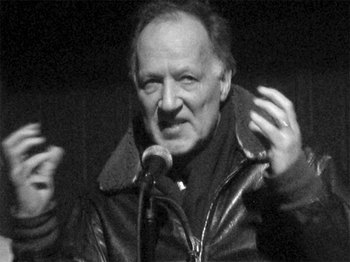 Werner Herzog stalks around the set of Zak Penn’s new improv film, The Grand, dressed all in black like a Teutonic Johnny Cash. He’s in character as The German, a truly nasty poker player who has come, along with his own personal menagerie (Herzog will explain this in the interview) to the National American Indoor Poker League championships prepared to do anything to win.
Werner Herzog stalks around the set of Zak Penn’s new improv film, The Grand, dressed all in black like a Teutonic Johnny Cash. He’s in character as The German, a truly nasty poker player who has come, along with his own personal menagerie (Herzog will explain this in the interview) to the National American Indoor Poker League championships prepared to do anything to win.
Herzog has a deceptively soft speaking voice, and I can’t hear what he’s saying from my vantage point, far off to the side. He’s seated at a table with a number of professional poker players and Saturday Night Live’s Chris Parnell, who is wearing a shirt that says “There is a 99.9999998% Chance I Am A Better Poker Player Than You.” The German is reacting as Parnell’s character, Harold Melvin, a hyper-nerd, keeps winning. Parnell is disparaging his opponent’s skills, and at one point invokes the Klingon Bird of Prey’s cloaking device. He thinks about it and, in another take, switches it to a Romulan Bird of Prey, probably a better fit. Herzog growls, all the while playing with a little Petri dish.
People tend to know Herzog rather than his film – many can tell you about how for Fitzcarraldo, where longtime collaborator and nemesis Klaus Kinski plays a man who hauls a boat over a mountain, Herzog actually hauled a boat over a mountain, but they probably haven’t seen the film. They may also be able to tell you about how Kinski and Herzog supposedly plotted to kill one another, or how Herzog lost a bet and had to eat his own shoe, which he dutifully did. The amazing thing about Herzog is that his films and his life are often equally mad and filled with strangeness and beauty – this past year he saved Joaquin Phoenix’s life when the actor’s car flipped over, and then disappeared into the night. Weeks later he was shot by an angry and crazy neighbor who was upset that the BBC were filming him on the street – Herzog never pressed charges.
The teaming of Zak Penn, best known for writing superhero movies, and Werner Herzog for Incident at Loch Ness was inspired lunacy. The movie is an improv’d mockumentary which pokes fun at Herzog’s well-publicized troubles behind the scenes of his movies. The film is completely hilarious, and it actually fooled a number of people.
While The German is as sinister a character as you can imagine, Herzog is, in reality, a completely sweet man. He would show up on the set of The Grand on days when he wasn’t working just to say hi and check in on every one – it was on one of his days off where he told an enraptured audience made up of me, Dave Davis, Brett Ratner and Woody Harrelson the story of the time he almost boarded a doomed plane, and the documentary he made about it, Wings of Hope – among other astonishing stories. The day before I sat down with Herzog and talked to him on the record about The Grand, his breakthrough hit documentary Grizzly Man, and his next film, Rescue Dawn, which just got picked up by MGM for domestic release, and which stars Christian Bale as a captured pilot in Laos during the Vietnam War, and is based on a documentary of Herzog’s called Little Dieter Needs to Fly.
How did you and Zak hook up?
Herzog: Zak and I were introduced by a common friend at the time when I was writing Rescue Dawn [who] advised me to get in touch with Zak because I was writing in English and I knew that my English isn’t that perfect. We met over this and Zak was totally enthusiastic about it, and so we became friends. He said he wanted to make a film about the monster of Loch Ness and he didn’t need much time to persuade me.
Does the improv come easily to you?
Herzog: It does.
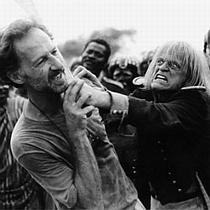 Why is that?
Why is that?
Herzog: I have acted in at least a dozen films. Some scripted, some non-scripted. Harmony Korine’s film Julien Donkey Boy wasn’t scripted at all, so it was completely invented while the situation unfolded.
Are you a poker player?
Herzog: Not at all. I’m not a gambler. I always have to ask for advice on what to do next – do I lose, do I win? Do I fold, do I raise?
There’s a very good poker player who distributes the cards so he takes notes of what we have in our hands, and he tells us that we better fold this time or that we’ll win this time. He arranges the cards in such a way that I can win.
Your character is The German. Can you tell me who The German is?
Herzog: He’s the ugly German! Completely intimidating. I get evicted fairly soon in the final rounds because I get caught cheating.
So he’s a dirty player.
Herzog: Dirty. Well, not dirty – ugly. As ugly as it gets.
You have this Petri dish in your hand… what is that?
Herzog: I travel with an entourage of body guards and a lot of animals in cages. I do have a little rabbit. It’s very sinister, I have to confess. Zak organized the part in such a way that I’m the one who needs to kill something each day in order to feel alive. [laughs] I’m trying to say, when speaking of killing something each day, sounds too much like a psychopath. For me it’s philosophical. To feel your existence you have to kill – no, I don’t like the term killing, I terminate. It’s as sinister as it gets, so it comes very easily to me.
And of course it’s very funny. I can see that because I was almost speaking into the camera and Zak sits next to the camera and I was speaking into his face and I see his face becoming purple. He was just about bursting out with laughter. It’s hard to stay deadpan when you see a face moments away from exploding with laughter.
[It never got addressed here, but the dish is filled with ants for The German to crush]
And when you’re working with great comedians I would assume it’s hard to keep a straight face. Is it a struggle to not crack up when they come up with something hilarious?
Herzog: No, it’s easy for me to do this, to stay in my role and to stay completely deadpan. I must say I love everything that has to do with cinema – writing, producing, acting, directing, lighting, editing – you just name it. I love cinema.
Rescue Dawn is inspired by Little Dieter Needs to Fly.
Herzog: Yes, but that was unfinished business. There is so much that was untold in Little Dieter Needs to Fly. So many things that I wanted to show… it was unfinished business.
Is this closure for you on that?
Herzog: I don’t need closure – I’m a storyteller. When you have a story and you know there are so many essential things that still need to be told then you better go for it.
You work so much – is the need to tell stories what motivates you to work that much?
Herzog: Probably, but I am not a man who is driven all the time. I am not a maniac. But I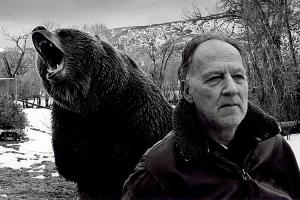 love my work and I do not like to hang around for years and twiddle my thumbs and hope that something will happen to me and some producer will offer me something. I always, when I am in between larger projects, I do a documentary. For example, Grizzly Man was done in 29 days. 9 days of editing, 14 days of shooting. From the first day of shooting to the first cut of the film being presented to the committee of Sundance was exactly 29 days. That film came so easily – it all fell in place, as if I was sleepwalking.
love my work and I do not like to hang around for years and twiddle my thumbs and hope that something will happen to me and some producer will offer me something. I always, when I am in between larger projects, I do a documentary. For example, Grizzly Man was done in 29 days. 9 days of editing, 14 days of shooting. From the first day of shooting to the first cut of the film being presented to the committee of Sundance was exactly 29 days. That film came so easily – it all fell in place, as if I was sleepwalking.
Were you surprised by the response that film got?
Herzog: The magnitude of the response surprised me, but I had the feeling from the very first moment that this was something very big. You can tell – it happens a couple of times in your life when you know that you’ve gotten into something and you better do it right now, this is big.
It’s a film that is going to stay, it’s not going to age. It’s not going to disappear after its first run, which was quite successful. It’s going to linger. This was a film that’s going to stay.
The themes are timeless.
Herzog: And the character and the environment, and wild nature – this is something I can deal with easily. But I always kept saying, ‘Do not expect me to do a film about wild nature, this is a film about human nature.’
This past year has been an incredible one for you. Besides Grizzly Man there was the Joaquin Phoenix incident, and the shooting.
Herzog: All not very significant. Being shot at is all part of the folklore. I love Los Angeles, and I take it easily. There’s a certain nonchalance to me about these things.
It seems that amazing things always happen to you. Has that been something that’s happened your whole life – have you always been the focus of incredible events?
Herzog: I think so, yeah. I have had a very, very densely packed life. Somehow, I don’t know what it is. It’s the way I like to live and it’s fine. I’m content with what I’m doing. I’m content with the place I’m living. I have the feeling that even if I make mistakes like everyone else, there’s some meaning in what I’m doing.
Between bigger projects you like to do documentaries –
Herzog: No, I don’t want to stop. I have no problem of doing very small things in between.
Is that a specific thing? Is there a point where you say, ‘I need to tell a narrative story,’ or where you say ‘I need to tell a documentary story’?
Herzog: No, it never occurs to me. I never plan. I have no career. I do not plan a career. Yeah, sure, I plan my next film because when I finish a film there are already five more projects pushing me. When I finish Rescue Dawn I have five feature films that I must do as soon as I can. They’re popping out of nowhere!
Popping out of nowhere?
Herzog: I do not know where they come from; they are just there. It’s like inviting people to a party – you just finish something and you invite two people to a party and the door is just a foot open and all of a sudden 85 people are crowding into your house and you don’t know where they came from. Did they come through the windows, through the door? And how do you get them out again?
Will Grizzly Man make it easier for you to pick which of that party guests you want to go with next, which you can get funded?
Herzog: It remains to be seen. It’s always complicated. Everywhere – in Hollywood, in China, in Japan, in Brazil. But I’m not one of those who are in the culture of complaint. I take it as it comes and I work hard and that’s the way I live.
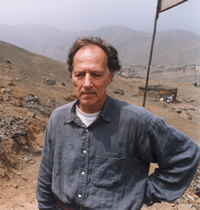 I know some filmmakers who don’t like to deal with that side of the process.
I know some filmmakers who don’t like to deal with that side of the process.
Herzog: I was always forced to do it. Literally until today I have almost never had offers to do movies, including Hollywood studios, but the projects almost never feel right for me. I have the feeling that Hollywood is looking to real storytelling again because audiences have seen so many digital effects and of course big stars and that doesn’t make a film yet. What has been neglected is storytelling, in the way that Treasure of the Sierra Madre or Casablanca [tell stories]. I think that part of Hollywood is readjusting and trying to go into real storytelling. Last year we had a very fine year of storytelling, like Capote and Brokeback Mountain. And lots of very good documentaries.
It was an incredibly crowded group of documentaries last year – what do you think has changed in the documentary world?
Herzog: I think there’s a very big background to that. The background is that we have an explosive evolution of new instruments for creating reality or pseudo-reality of invented reality; digital effects, virtual reality and the net, reality TV, PhotoShop itself. All of a sudden filmmakers, and we as an audience, are forced to readjust our attitudes towards reality. What constitutes reality? There will be many great documentaries because audiences are longing for films that point back to the reality of their lives. We have find new way to express this – it’s a great time for filmmaking, and a great time in particular for documentaries. But not in the way that cinema verite was done – that was the answer of the 60s.
Grizzly Man is a documentary that is about Treadwell but is also an editorial and a discussion with him –
Herzog: An ongoing argument.
A lot of people think of documentaries as only fact, fact, fact…
Herzog: We have to look after that, but beyond the facts there is something we have forgotten to ask about, and that is the truth. Where is the truth that illuminates us? I’m after an ecstasy of truth, an ecstatic truth. And not just in documentaries – in all my feature films you see this quest for illumination, this ecstasy of truth. I have my way to do it, but I see many, many others who are doing very bold and unusual new things in documentaries. I really welcome that.
Is it harder to find that truth in a narrative feature?
Herzog: It’s always elusive. It is always mysterious. You have to have a very clear vision, a very deep vision. If you don’t have that, don’t go into filmmaking.
Does that vision always have an endpoint, or do you discover that along the way?
Herzog: It’s hard to answer that because each film has its own life, its own rules, its own quirks, its own caprices, its own unruliness. To a certain amount you have to allow all this unruliness to enter into the film. That’s the reason I never like to have storyboards – it’s all pre-fabricated. Storyboards are instruments for the cowards who do not trust their imagination when filming. Of course storyboards you would need when you are doing a real scene with very complicated digital effects in the background. But otherwise I know it’s not my tool.
In Rescue Dawn you work with Christian Bale, an actor who feels like he’s just on the edge of really breaking through to the next level –
Herzog: I hope he gets there soon, because I feel he is among the best of his generation.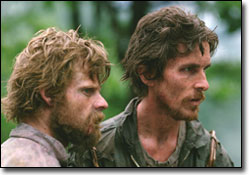 There are some very, very good ones out there. Tim Roth. There are a couple of very good ones, but in Rescue Dawn I think [Bale] is better than he ever has been before. The rest of the cast is great – Steve Zahn, Jeremy Davis, they’re just very good.
There are some very, very good ones out there. Tim Roth. There are a couple of very good ones, but in Rescue Dawn I think [Bale] is better than he ever has been before. The rest of the cast is great – Steve Zahn, Jeremy Davis, they’re just very good.
Christian Bale seems to go to such extremes for his performances – he lost all that weight for The Machinist, bulked up for Batman. Do you find that he’s going for that same kind of truth that you are?
Herzog: We united our forces in that respect. You have to wait and see – there are things that you won’t believe!
You said you always have five projects crowding into you –
Herzog: At the moment it’s five, but sometimes it’s eight or ten. I never know how to keep abreast!
Do you have something that you’re looking at for after Rescue Dawn?
Herzog: I start something in November/December in Antarctica. I am writing another screenplay now and writing another screenplay four weeks from now and preparing a couple of things.
Is Antarctica going to be a narrative or a documentary?
Herzog: Part of it is going to be a documentary but I am also shooting footage for a science fiction film. After Grizzly Man I made a science fiction film called The Wild Blue Yonder.
I have heard of that – is it not finished?
Herzog: It is finished. It was shown at the Los Angeles Film Festival about ten days, twelve days ago. It was very well received, but I was not in town. I was at the East Coast at the time. It’s circulating with five, six prints around the country, and the DVD is going to be out in November. It was shown a year ago at the Venice Film Festival and I couldn’t be there either because I was at the border of Burma and Thailand, and there it got standing ovations and I won the international critics award, even though it was not in competition! They decided to toss this confetti at me anyway.
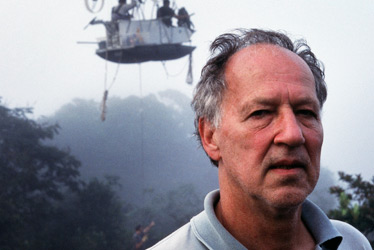 You bring up the DVD – how does that effect you as a filmmaker? Does the fact that there’s a second life for these films make any difference for you?
You bring up the DVD – how does that effect you as a filmmaker? Does the fact that there’s a second life for these films make any difference for you?
Herzog: It does in a way. Recently my brother released a six pack of DVDs with 25 films, shorter films and documentaries and stuff, which wasn’t available for decades. They are available now for audiences who heard about the film but for 30 years never had a chance to see it.
But when you’re shooting now do you think that you might have the chance to include additional scenes on the DVD?
Herzog: I don’t like that. I don’t like additional scenes into a DVD – I always throw things away that were discarded during editing. I think a carpenter doesn’t sit on his shavings either. But of course audiences like to have commentaries, for example Grizzly Man has a very fine film about the making of the music with Richard Thompson. It’s a very fine gift you get with the DVD.